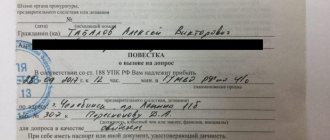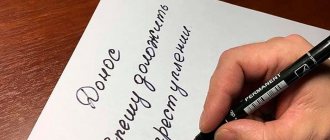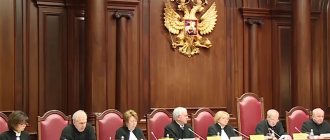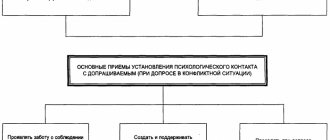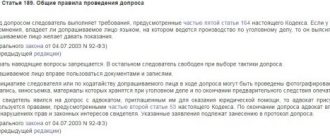According to procedural law, failure to appear in response to a summons to an investigator without good reason can result in very unpleasant consequences for the participants in a criminal case. But only if this document was handed over signature to the summoned person or one of his relatives who took on such an obligation. Otherwise there shouldn't be any problems.
Receipt
According to Art. 188 of the Code of Criminal Procedure, a witness to an atrocity or a victim is summoned for a procedural conversation with the investigator only by a summons. In this case, the person must be given this document in person and against signature. Otherwise, in the future the citizen may simply not appear for questioning, justifying this fact by the fact that he was not properly notified. In this case, he will be absolutely right. In addition, if the person to whom the summons must be served is temporarily absent, then it can be handed over to one of the adult members of his family against signature.
This document is also presented through the administration of the place of work or study. In the latter case, this applies only to those individuals who are under 16 years of age. In addition, these minors are summoned for a procedural conversation through their legal representatives. If the person was properly notified of the invitation to interrogation, then failure to appear in response to the summons to the investigator can have very unpleasant consequences, including arrest and the imposition of a monetary penalty.
Persons not subject to interrogation
According to Art. 56 of the Code of Criminal Procedure, witness testimony cannot be demanded from the following persons who received information about a crime in the performance of official duties:
- Judge, juror, arbitrator (arbiter).
- The lawyer of the suspect (accused) or other person who has applied for legal assistance and provided information regarding the case under investigation. The exception is cases when the lawyer himself requests interrogation in the interests of his client and with his consent (or the consent of another person).
- President of the Russian Federation.
- A member of the Federation Council, a State Duma deputy, unless they express their consent.
- Diplomat.
- Commissioner for Human Rights in the Russian Federation.
- Inspector of the Tax Service.
- Priest.
The procedure for questioning a witness under the Code of Criminal Procedure of the Russian Federation, as well as an example of an interrogation protocol can be found in a separate article https://lexconsult.online/6832-poryadok-doprosa-svidetelya-po-upk-rf
Witness immunity also applies to:
- a suspect who has the right to refuse to provide information discrediting him;
- close relatives of the defendant.
If these persons are nevertheless summoned for questioning, they must appear at the place of demand and present documents confirming their immunity.
Sample
When calling a citizen to the investigator, it is necessary to correctly draw up the procedural document. It should indicate in what capacity this person is being called and for what purpose. All unpleasant consequences that await a person should also be listed if his failure to appear on a summons to the investigator does not have valid reasons. As a rule, a citizen must confirm his absence with appropriate papers. This document is completed as follows:
- Summons for questioning 00.00.00, city ______________ In accordance with Art. 188 of the Code of Criminal Procedure, you must appear on 00.00.00 at the police department of the city of ________ as a witness in case No.___ to testify. You must have a passport or other identification document with you. In case of failure to appear without good reason, procedural coercion measures provided for in Art. 111 Code of Criminal Procedure. Investigator of the Department of Internal Affairs, Captain of Justice __________________ (signature)
From this example it is clear that the law enforcement officer indicates in the document all the consequences awaiting a person who was duly notified of a summons for questioning, but did not appear for it. Therefore, failure to appear under a summons to the investigator must be officially confirmed. For example, sick leave.
Agenda information
The summons must contain the following information:
- Recipient's name and address;
- purpose of the call;
- Full name of the investigator;
- address of the institution and room number where the interrogation will take place;
- date and time of appearance at interrogation;
- measures taken against the summoned person in case of failure to appear.
A sample summons for questioning can be downloaded here
Methods of transmitting notice
A notice of summons for interrogation is delivered to the addressee’s place of residence and handed to him personally. In his temporary absence, the summons is transmitted to:
Helpful information
In order to assist the investigation and protect your rights, you need to know how to behave during interrogation. You need to be confident and refuse to give evidence if you do not remember it in whole or in part. If you are not given a protocol to sign, it is not valid. You can find out more tips in the article here
- a close relative who has reached the age of majority;
- to an administrative employee at the place of work;
- to other persons (organizations) on behalf of the investigator.
A receipt is taken from the recipient, which indicates the date and time of transmission of the notice. Temporary absence means the intended return of the addressee within 24 hours or within a period sufficient for a timely visit to the place of interrogation. Also, the summons can be sent by mail, telephone, via the Internet and other means of communication with the obligatory indication of details. A summons for questioning by telephone without a summons cannot be considered lawful.
Subpoena delivery on behalf of the investigator
The legislation does not establish the form of instructions sent to third parties to transfer the subpoena to its destination. It is still better if it is in writing. The order can be entered directly into the text of the agenda in a separate column. It is also not required to accompany it with the issuance of a corresponding resolution. However, the need for this may arise when certain powers are transferred to other investigative bodies.
Special procedure for calling for interrogation
In relation to some persons, separate rules for serving a summons apply:
note
It is important to distinguish between the concepts of interrogation and interrogation. The main difference is that the materials used during the survey cannot be used as evidence.
- Persons under 16 years of age are summoned for questioning through:
- parents (guardians);
- management of the educational institution;
- administration at the place of work.
- Those in custody and serving time in places of deprivation of liberty are notified of the summons by the administration of the correctional institution.
- Military personnel are notified by the head of the military unit.
- Persons located abroad may be called upon to testify only with their consent. They are not subject to criminal or other prosecution for 15 days from the moment when the investigative need for their presence has ended.
- Those detained outside the Russian Federation are transferred for questioning by an official of a foreign state in accordance with international agreements.
Drive unit
If a person is summoned to appear before an investigator, the citizen must appear at the appointed time at the authority specified in the document. Otherwise, the person may be forcibly taken there based on the order of a law enforcement officer.
In addition, a citizen who is summoned by summons must notify the investigator of his absence if there is a good reason for this, and then confirm his words with a written document. In this case, the police investigator will not bring the person into custody, but will simply schedule another time for a procedural conversation. It should also be noted here that this measure of procedural coercion can be applied to suspects, accused and victims.
The drive does not apply to persons under 14 years of age, women expecting a child, and sick people who need to stay at home for health reasons. In addition, this measure of procedural coercion is not carried out at night. In the event that a citizen is subjected to arrest, this must be justified in a decision issued by the police investigator.
Commitment
Responsibility for failure to appear in response to a summons to the investigator will only occur if the person was properly notified of the upcoming procedural conversation. Even if a person received this document in his hands, but did not put his signature on another copy, which is returned to law enforcement agencies, this will also mean that the citizen knew about the upcoming interrogation. In this case, the investigator may impose an obligation to appear on such a person. It will consist in the fact that a citizen must come to law enforcement agencies upon the first call from an employee. Otherwise, preventive measures may be applied to him.
Moreover, this obligation applies not only to suspects and accused persons, but also to witnesses and victims. By signing such a document, a citizen assumes certain functions, which consist, first of all, of reporting a change of residence to the investigator and appearing upon his first call. Of course, this is already an extreme measure of procedural coercion. It is used only if the law enforcement officer is not sure that the person will independently appear for questioning. Therefore, having received a document such as a subpoena, the witness must arrive at the specified time to give evidence to the body indicated in it.
The investigator is your enemy: 10 tips from a lawyer during interrogation
Being summoned for questioning by the competent authorities to testify as a witness or suspect is always stressful, but you need to be prepared for such a situation. When can you not come for questioning? Under what circumstances does an interrogated person have the right to remain silent? How to avoid answering tricky questions? What can be countered to the investigator's tricks? How not to succumb to threats and blackmail? Dmitry Aleksashin, a former employee of the Investigation Department of the Ministry of Internal Affairs, lawyer, partner of the PASMI Legal Center, answers these and other questions.
The main thing you need to know when you are called in for questioning is that the investigator is not your ally. The exception is if you are a victim in a criminal case. Law enforcement officials have their own goals and objectives, often very different from yours. You should not trust information from the investigator; it may be unreliable even if he says that he is acting in your interests. Only a lawyer acts in your interests.
Conventionally, the interrogation of an investigator can be divided into three stages: preparatory (summoning for interrogation), main (interrogation itself) and final (reading and signing the protocol).
Tip one: tell your employer
As soon as you learn that a law enforcement officer intends to obtain a statement from you, inform your employer. If you work for a small company, you need to take care of a lawyer yourself.
Tip two - come according to the agenda
A witness or suspect is summoned for questioning using a subpoena. The summons is served either personally on the summoned person or sent to him by mail. If a person fails to appear without a good reason, the investigator has the right to forcefully bring him in.
Notify the investigator in advance of your inability to appear for questioning and ask to reschedule the date or time of questioning. If you can confirm the validity of the reason for a witness’s failure to appear for questioning, support this with relevant documents. For example, a medical certificate in case of illness, or air tickets if you were not in Russia on the date of interrogation by the investigator.
Illness or business trip are grounds for failure to appear for questioning by the investigator. The impossibility of appearing must be notified by a petition or telegram. As a last resort, call. But the conversation must be recorded.
Tip three - do not refuse a lawyer
If you are called in for questioning, avoid any communication with the investigator without the approval of your lawyer. Any negotiations with the investigator, including by exchanging messages using Internet messengers, by email or telephone, are best carried out with the knowledge of the lawyer.
You should not attend a witness examination without a lawyer. During the interrogation, the lawyer has the right to give you brief advice of both a legal and tactical nature. In addition, the lawyer will ensure that your rights are not violated during the interrogation.
By appearing for questioning by an investigator without a lawyer, you are leaving yourself without qualified legal assistance in a situation where legally trained law enforcement officers are playing against you.
The right to have a lawyer when questioning a witness is provided for by the criminal procedure law. It is advisable that a lawyer be present initially. However, at any time you can request a break in the interrogation in order to ensure the participation of a lawyer. If the investigator does not satisfy this request, the interrogation of the witness can be postponed, citing poor health.
Tip four - prepare a written position
It is necessary to prepare for the interrogation of the investigator. If you are summoned for questioning, it is necessary to find out the reason for the summons for investigative action. It is necessary to analyze the situation in detail and develop a written position with the participation of a lawyer to answer possible questions from the investigator.
The interrogation of a witness is carried out in order to clarify circumstances relevant to the criminal case. However, we must remember that the investigator independently determines during the interrogation what information is important. During the interrogation, the investigator has the right to ask questions at his own discretion. The witness must be prepared for a wide range of questions that the investigator may ask, not limited to the circumstances of the criminal case under investigation.
Tip five - don’t take anything unnecessary with you
Remember: in order to obtain evidence in a criminal case, the investigator has the right, before, during, or after the interrogation of a witness or suspect, to seize objects or documents that the witness has with him. When interviewed by an investigator, take with you only those items and documents whose seizure does not pose any risks. If you do have such items and documents with you, hand them over to your lawyer before communicating with the investigator.
Tip six - remember the right to refuse to testify
Before the interrogation begins, the investigator explains to the interrogated the rights and obligations. You should pay attention to Art. 51 of the Constitution of the Russian Federation, which enshrines the right of the interrogated person not to testify against himself and his close relatives, the circle of whom is determined by law. Thus, any person, on the specified grounds, has the right to refuse to give testimony (explanation).
The use of this constitutional norm does not indicate that the interrogated person is hiding any circumstances, and cannot be considered as evidence of his guilt. The use of one's constitutional rights cannot worsen the situation of the person being interrogated. A person may submit a request for additional questioning at any time.
Before the start of the interrogation, the investigator warns the witness about criminal liability for refusal to testify (Article 308 of the Criminal Code of the Russian Federation) and giving knowingly false testimony (Article 307 of the Criminal Code of the Russian Federation). The witness may be subject to such liability in the future.
You should not tell the investigator that you refuse to testify. However, if the situation is not clear to you, the answer to the question cannot be given without preparation and may entail risks for you or close relatives, it is better not to testify, referring to Article 51 of the Constitution.
Tip seven - answer briefly and to the point
When interrogating an investigator, do not be afraid to clarify questions and answer only the question posed. Listen carefully to the investigator's questions. Make sure you understand the question. Do not hesitate to ask again and ask for clarification of the question if you do not understand something, or if the question seems too general or abstract to you. Always try to remain calm and have a clear assessment of what is happening.
If the investigator asks you to state the circumstances of interest to him in free form, answer briefly and concisely. Do not express assumptions or opinions; in your answers, refer only to facts. Analyze every word you say based on possible risks.
During the investigative action, the interrogated person has the right to use the documents and records available to him. You can use a draft of your position during the interrogation of a witness, explaining to the investigator that in this way you will more accurately reproduce past events.
Ideally, your testimony should be set out verbatim in the protocol of the investigative action, and the investigator will act as the person who will record the position prepared in advance. Remember, if you were not asked something and you did not answer something, this does not mean that you lied.
Tip eight - don’t be afraid to answer “I don’t remember”
When interrogated by an investigator, do not hesitate to answer questions “I don’t remember.” This is especially true for “slippery” topics, as well as those questions that you are not ready to answer right now. This will allow you to gain time and prepare for the correct answer. It is the investigator's responsibility to ask questions and think them through in advance.
Tip nine - study the protocol
Do not allow the investigator to arbitrarily interpret your words. Carefully study the witness interview protocol before signing it. Everything should be stated exactly as you said, in the same wording.
If something is missing or you want to add something, then request changes to the protocol before signing. If the investigator refuses to make them, write the additions in your own hand at the end of the protocol - in the column “Comments to the protocol.”
Tip ten - don’t rush to sign
Never sign an interrogation report without reading it. During the interrogation of the investigator, the witness has the right to read the protocol; to confirm the correctness of the testimony stated in the protocol, the witness signs each sheet of the protocol.
Even if the investigator assures you that everything in the interrogation protocol is written down from your words, even if you are in a hurry, even if you are urged on and demanded to sign the protocol as quickly as possible (especially in this case), do not sign it without reading it. Remember that the record of interrogation of a witness is evidence in a criminal case. Anything you say during interrogation can be used to accuse you or someone else of a crime.
Always ask for a copy of the interview report as a witness. The investigator is not obliged to give it, but has the right, and you can ask for it. Before signing the protocol, you have the right to rewrite the text of your interrogation in your own hand.
What does the investigator not have the right to do?
The law does not provide for summons for questioning by telephone. The only exception is if you have given written consent to this in advance. If the investigator claims that a subpoena was sent to you, it is better not to avoid appearing for questioning.
The interrogation cannot last continuously for more than 4 hours . The interrogation may be continued after a break of at least one hour. The total duration of interrogation should not exceed 8 hours during the day.
Carrying out investigative actions at night ( after 10 p.m. ) is possible only in urgent cases. However, continuation of interrogation at night is possible with the consent of the person being interrogated. Before giving such consent to the investigator, analyze the appropriateness of this action.
Carefully ensure that the time indicated in the interrogation protocol corresponds to the actual time of interrogation. If there is any discrepancy, please indicate this in the “comments” column. When interrogated at night or for an interrogation lasting more than 8 hours, use the following formulations: “I am tired, I cannot testify at night,” “The duration of my interrogation is more than 8 hours, I am tired, I cannot give further testimony.”
Remember: the use of violence, threats and other illegal measures is unacceptable during investigative actions. The investigator may be held criminally liable for forcing a witness to testify (Article 302 of the Criminal Code of the Russian Federation). During the interrogation, the investigator does not have the right to threaten the witness (including with imprisonment).
Always make comments in the interrogation protocol and keep an undisclosed audio recording.
If you need qualified assistance from lawyers, please contact the PASMI Legal Center (write, call - 8 (495) 998-20-40.
If you have information about corruption violations by officials and law enforcement officers, write to the PASMI section “Report Corruption.”
Collection
Another no less sad consequence of failure to appear on a subpoena is that a small fine may be imposed on an unscrupulous witness. Monetary recovery in this case is provided for in Art. 111 Code of Criminal Procedure. It is a measure of procedural coercion. That is why a police summons is considered a serious document, the receipt of which must also be approached responsibly.
Presentation
According to Art. 188 of the Code of Criminal Procedure, the summons must be handed over to the person personally against signature. If the citizen is absent, it can be given to another adult member of his family. If a person did not sign for a summons, but received one, he is considered aware of the summons to law enforcement agencies. Failure to appear before the investigator in this case will have unpleasant consequences.
If the summoned witness has not reached the age of sixteen, then the summons must be served on him through his parents or the administration of his studies or work. At the same time, the latter assume obligations to transfer it to the addressee. If a citizen does not sign the summons, then a corresponding entry is made about this on the document that is returned back to law enforcement agencies.
Procedure for calling for questioning
Interrogations of a victim, accused, witness, suspect or expert differ significantly from each other.
For the accused or just the suspect, interrogation is an opportunity to defend themselves, their right, and not an obligation, as in the case of other listed persons.
The summons itself is carried out by summons, which can be served in several ways, which we will discuss below.
The actual conduct of the interrogation itself at the stage of preliminary inquiry and investigation is assigned to the criminal prosecution body.
Citizens under the age of majority are summoned exclusively through their parents or their other legal representatives.
Who can be summoned to the tax office for questioning as a witness?
The Tax Service, in accordance with current legislation, has the right to summon for questioning individuals who may know any circumstances that are significant for conducting a tax audit. This is discussed in detail in Article 90 of the Tax Code of the Russian Federation.
Whom the tax service cannot call as a witness
There are three categories of citizens who cannot be questioned by tax officials:
- Citizens who, due to the performance of their professional duties, have information that is of interest to the tax service, if this information relates to their professional secret (for example, these could be lawyers, auditors, notaries).
- Citizens who, due to their mental or physical disabilities, cannot correctly perceive the circumstances that are important to the tax authority.
- Persons under fourteen years of age.
Procedure for calling accused and suspects
The accused is given a summons against signature, and if he is temporarily absent, then - to a member of his family (but only one who must be an adult) or to the administration of the organization in which the accused, or for now only the suspect, works.
After the person summoned has read the decision on his involvement as an accused, he is given copies of the decision itself, as well as a protocol stating that all his rights have been explained to him. A copy of the same resolution is simultaneously sent to the prosecutor's office.
If the accused does not appear for questioning , and he does not have a valid and sufficiently serious reason for this, then he may be brought in by force. In this case, the following will be recognized as valid reasons:
- natural disasters;
- death of his close relatives;
- illness for which he is unable to appear;
- other circumstances that may deprive the person being called of the opportunity to appear on time for questioning.
Important! In the above situations, the accused is obliged to notify the official who summoned him for questioning about the reason for his failure to appear at the time appointed by him.
A suspect or accused who is already in custody is summoned for questioning directly through the administration of the place where they are being held.
The interrogation is carried out in the same place as the preliminary investigation in this particular case, but if necessary, the investigator can conduct it in the place where the interrogated person is located.
As a rule, interrogation is carried out during the daytime and only on weekdays , except in cases that are urgent. And it cannot be longer than four hours without a break, which, in turn, must be at least one hour.
The total duration of interrogation throughout the day should be no more than eight hours. However, there are also cases where, due to written medical testimony, the duration of such interrogation for individuals can be significantly reduced.
Consequences
A citizen who is summoned to a procedural person under a subpoena must appear at the time specified therein and at the specified address to give evidence to the investigator. Otherwise, the measures provided for in Art. 111 Code of Criminal Procedure. If an individual, due to illness, business trip or other valid reason, cannot arrive at a law enforcement officer within the specified period, then he must report this, and then confirm his words with official documents. As a rule, the investigator always meets the person halfway. He will reschedule the interrogation for another time if there are good reasons or will conduct it in the house of the witness or victim.
Subpoena for questioning: law
A subpoena is a document issued by a judge or other official to summon a witness for questioning. However, this practice is applied only for criminal proceedings. There is a difference between a subpoena for a survey and for an interrogation.
A summons for questioning is sent as part of an already initiated criminal case. And the survey is carried out during the pre-investigation check. The latter is necessary to collect relevant evidence and understand whether there are grounds to initiate a case. It is necessary to understand who has the right to summon for questioning and interrogation:
- judges;
- Investigative Committee employees;
- police investigators;
- FSB investigators;
- police investigators;
- FSSP employees.
Extract from Article 188 of the Code of Criminal Procedure of the Russian Federation
Thus, if the document did not come from an authorized person, then the requirements can be ignored. Article 188 of the Code of Criminal Procedure of the Russian Federation states that a subpoena calls only for questioning. However, Chapter 26 of the Code of Criminal Procedure of the Russian Federation also allows individuals to be summoned to carry out other necessary investigative measures.
Meaning
A summons is a procedural document that is issued only to those persons whose testimony can help the investigation uncover the crime committed as quickly as possible, so this document must be taken very seriously. As a rule, the summons indicates in what capacity and at what address the citizen is summoned. A note is also made that in case of failure to appear at the specified time, the person may be subject to arrest.
